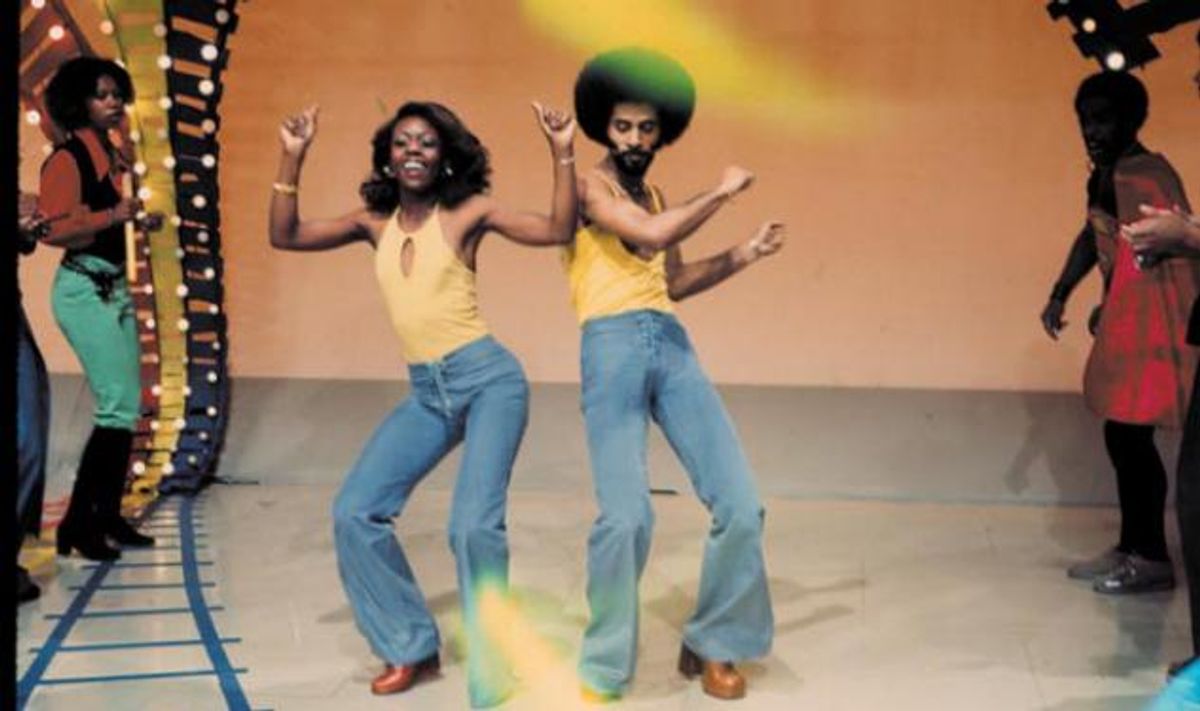Soul Train is perhaps best remembered for introducing the "Soul Train line" into the cultural lexicon (and into every party worth even half a damn), but as TV's first national black music show, it proved nothing short of revolutionary in its depictions of race, fashion and sexuality.
The Hippest Trip in America: Soul Train and the Evolution of Culture and Style, a new book by renowned critic Nelson George, boogie-oogie-oogies down the history of the iconic show, from its inception in Chicago in August 1970 through its 35 years as the longest-running syndicated program in history.
 Soul Train was responsible for presenting a positive image of black America,
Soul Train was responsible for presenting a positive image of black America,
for black America, in a time of great social upheaval and unrest. Memories of the assassinations of Malcolm X, Dr. King, and the Kennedys still fresh on the national conscience, Soul Train's message of love, peace and soul resonated with its multi-ethnic cadre of dancers, who every week brought the latest, greatest moves and styles into the living rooms of every race and economic background.
The book also delves, albeit briefly, into how black gay club culture influenced Soul Train, years before disco would co-opt the soul, funk and R&B that were the show's bread and butter from the very beginning. The show gave a platform to gay dancers, like Tyrone Proctor, who would become a favorite of eternally-cool host Don Cornelius: "I'm sure Don was aware there were many gay dancers on Soul Train, but he turned a blind eye," Proctor recalls.
Proctor was one of the originators of a fierce style of dance developed in the gay Los Angeles clubs called waacking, a precursor to voguing in New York's ball community. And much like voguing, waacking transcended its humble origins to achieve international prominence, with gays and straights mixing seamlessly on that great equalizer -- the dancefloor.
"At the straight clubs then, the DJs would be on the mic promoting some event or himself and they'd be playing a whole lot of soul music," Proctor says. "At the gay club, they were concerned about the sound system, and they'd be playing straight-up disco and the focus would be on dancing. So we began attracting straights. A lot of people don't know that the bump came out of those gay clubs and then moved into the mainstream. Waacking wasn't the only dance of that era to move out from the gay clubs. "
Soul Train offered a rare glimpse into gay culture, including it as a part of the Soul Train family where everyone was united under the groove, as former dancer and noted '80s pop diva Jody Watley told George:
"Though unspoken, Soul Train had an obvious black male gay culture going on, and for that reason the show was also quite forward," Watley says. "Don allowed everyone to be themselves on camera--that's clear when you watch old clips."
Further exemplifying why people in the '70s were a lot cooler than you or I could ever hope to be. Take a note, kids:




"The Hippest Trip in America: Soul Train and the Evolution of Culture and Style" by Nelson George (Hardcover, $27.99, 256pp) available now at HarperCollins.com




 Soul Train was responsible for presenting a positive image of black America,
Soul Train was responsible for presenting a positive image of black America,

















































































